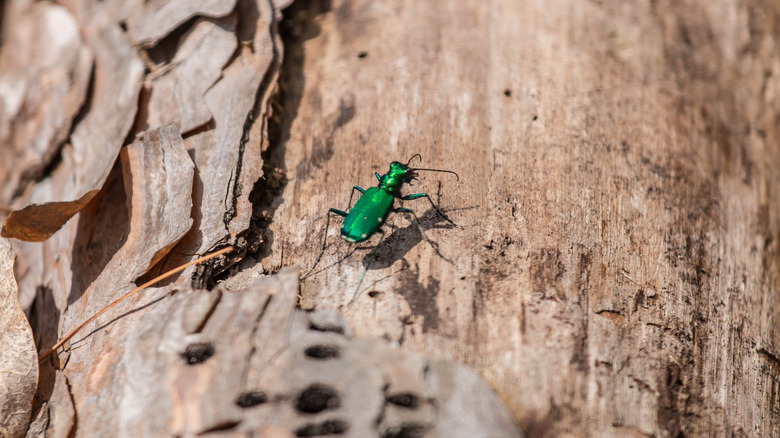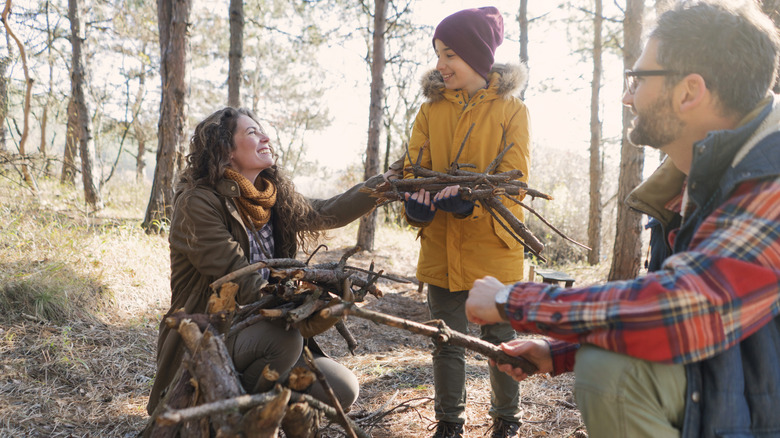Camping
Amanda Morgan
Camping is the perfect way to escape into nature and spend quality time with your loved ones. With so many beautiful national parks and camping destinations around the world, you’re sure to find plenty of opportunities to unplug and immerse yourself in natural beauty year-round.
After spending long days hiking, exploring, and setting up camp, nothing beats relaxing under the stars around a cozy campfire with family and friends. Whether you’re cooking a hearty meal, roasting s’mores, or swapping scary stories, there is something wonderfully nostalgic about gathering around a fire.
Campfires are one of life’s simple pleasures, but you must take extra care when building your fire. As you load up the car for your camping trip, you may be considering bringing some firewood from home or purchasing it before you embark on your journey — but moving firewood can have some seriously damaging consequences for the forests. In many cases, it’s even illegal.
The risk of moving firewood

Don Bilski/Shutterstock
Firewood should never be brought with you as you move between locations, even if you only travel a short distance. You might not notice at first glance, but firewood is often contaminated with insects and diseases that can be extremely harmful to certain species of trees and native plants.
According to the National Park Service, when you toss a bundle of firewood in your vehicle, you might be unintentionally harboring some nasty fugitives. Some of the most common species that may cause issues include insects like the Emerald Ash Borer, a tiny green beetle from Asia first found in Michigan in 2002. Since then, the insect has managed to infiltrate 35 states and kill millions of Ash trees across the country.
Fungi also pose a significant threat. Oak wilt is a disease caused by a fungus that is spread when insects eat the sap from an infected tree. It can quickly wipe out multiple trees, and the beautiful red oak trees can die just a few weeks after exposure to the fungus.
What to do instead of transporting firewood

Srdjanpav/Getty Images
Fortunately for campers, it’s easy enough to avoid being part of the problem. The Nature Conservancy founded the Don’t Move Firewood campaign to encourage campers to gather or purchase firewood locally instead of transporting it with them to help protect defenseless forests from harmful invasive species. Since then, many states like Colorado, have moved to outlaw moving firewood across state lines.
The best firewood for the environment comes from within 10 miles of where you plan to burn it. If that isn’t possible, firewood purchased less than 50 miles away should be okay, according to the Don’t Move Firewood outreach campaign.
Instead of transporting firewood from out of town, it’s best to gather firewood from around your campsite when permitted. If gathering firewood isn’t possible, your next best option is to purchase firewood locally. Many campgrounds and supply stores will sell bundles of wood for campers.
If purchasing firewood, it’s best to choose packaged heat-treated firewood, which should have a label from the state where you bought it, according to dontmovefirewood.org. Keep in mind that firewood that is kiln-dried as opposed to heat-treated is not safe to move — that’s because wood that is “kiln-dried” has no specific, legal standard and may still harbor pests and diseases. Heat-treated wood, on the other hand, must conform to a set of specific guidelines that makes it safe to move.
When you leave your campsite, any firewood you gathered during your camping trip must stay behind. The next campground guests will appreciate it, and you won’t risk carrying home unwanted pests or diseases.

